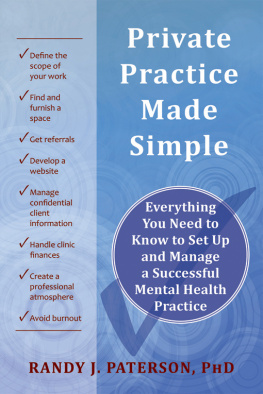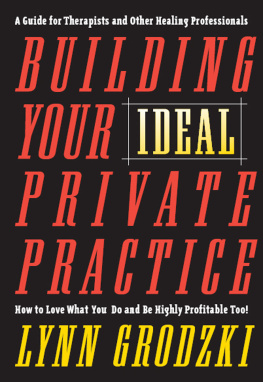Randy J. Paterson, PhD, owns and operates Changeways Clinic, a private multiple-provider outpatient practice in Vancouver, British Columbia. He is author of The Assertiveness Workbook and Your Depression Map. Through Changeways Clinic, he presents lectures and workshops internationally on topics including mental health policy, cognitive behavioral therapy, the nature and treatment of depression and anxiety disorders, and strategies for private practice management. He was the 2008 recipient of the Canadian Psychological Associations Distinguished Practitioner Award. For more information on Paterson, his presentations and workshops, or Changeways Clinic, visit www .changeways.com.


Publishers Note
This publication is designed to provide accurate and authoritative information in regard to the subject matter covered. It is sold with the understanding that the publisher is not engaged in rendering psychological, financial, legal, or other professional services. If expert assistance or counseling is needed, the services of a competent professional should be sought.
Distributed in Canada by Raincoast Books
Copyright 2011 by Randy J. Paterson New Harbinger Publications, Inc. 5674 Shattuck Avenue Oakland, CA 94609 www.newharbinger.com
Cover design by Amy Shoup
Acquired by Melissa Kirk
Edited by Nelda Street
All Rights Reserved
The Library of Congress has cataloged the print and PDF editions as:
Paterson, Randy J.
Private practice made simple : everything you need to know to set up and manage a successful mental health practice / Randy J. Paterson.
p. cm.
Includes bibliographical references.
ISBN 978-1-60882-023-8 (pbk.) -- ISBN 978-1-60882-024-5 (pdf ebook)
1. Mental health counseling--Practice. 2. Psychotherapy--Practice. I. Title.
RC466.P38 2011
616.8914--dc22
For Geoff
Acknowledgments
No one learns entirely by trial and error. While setting up my clinic and, much later, writing this book, I consulted more people than I can name. I am particularly grateful to the following friends and clinicians for their invaluable input: Dan Bilsker, Martha Capreol, Anne Howson, William Koch, Susan Mackey-Jamieson, Lisa Shatford, and Adrienne Wang. I am indirectly indebted to Richard Wright for the sailing metaphors and for making a bet that he would finish his book before I finished this one. He won.
Many thanks go to Barbara Fredrickson, who took time from her schedule to provide useful input that found its way into chapter 8. Paul Belserene broke me of the habit of writing rapid replies to e-mail, and he provided feedback on the original title of the book. Alain de Botton inspired me through his writing, and he pointed the way toward a useful quote. David Burns provided comments on passages involving clients commitment to therapy. Marilyn Ransby offered useful clarification on some of the vagaries of U.S. taxes and health insurance. My early mentors Bill Newby, Jack Sweetland, and Jim Neufeld provided many ideas that have survived the years and have found their way into this book.
I would also like to thank participants in the British Columbia Psychological Association Internet forum, who weighed in on issues including the attractions and anxieties of private practice, the dress of psychologists, and personal strategies for avoiding burnout. Those who provided suggestions include Galia Artzy, Robinder Bedi, Catherine Bond, Dianne Chappell, Elsie de Vita, Anne Dietrich, Cam Ellison, Jane Flint, Lynda Grant, Tracy Halpen, Amy Janeck, Peter Johnson, Gary Lea, Jeanne LeBlanc, Joanne MacKinnon, Rachel Mallory, Catherine McLaughlin, Alison Miller, Lynda Murdoch, Rami Nader, Theresa Nicassio, Serena Patterson, Don Ramer, Lara Robinson, Joti Samra, Susanne Schibler, Eroca Shaler, Raymond Shred, Charlotte Sutker, Maria Undurraga, John Wagner, Judy Weiser, and Alina Wydra.
I have offered workshops on practice management for several years and have shamelessly mined attendees comments and observations for material for this book. To all such workshop participants, I give my thanks.
As always, the staff at New Harbinger Publications has been extremely encouraging and helpful. Matthew McKay is surely one of the most accessible and enthusiastic publishers in the business. Melissa Kirk guided the book from a flurry of acceptance e-mails to publication. Nelda Street provided detailed copyediting that markedly improved the tone and flow of the book. Regrettably, I can blame none of them for any failings, inaccuracies, or deficiencies, which are entirely my own contribution.
Geoff Bannoff provided useful input on financial concerns, website design, and computer security, based on his experience managing a much larger organization than most psychologists will ever have to face. His patience and endless support are most appreciated.
Introduction
Heres the big secret: No one really teaches you how to manage a mental health or counseling practice. As clinicians we stumble through our careers, gradually picking up shortcuts and strategies that make our lives (or those of our clients) a lot easier. Many of these useful ideas arent rocket science and could have been taught to us in an afternoon if anyone had thought about it. Thats what this book is for: its nothing more than a collection of useful basic tips.
I attended a graduate program in clinical psychology that was aggressively research oriented. The course work emphasized research strategies. When treatment came up, it was in the form of outcome trials. We would learn all the details of the study design, the treatments applied (or not) to various groups of subjects, and the results obtained. We spent hours analyzing the type 1 error rate (per contrast, per time, per study?). Only two things were missed:
- How to conduct treatment
- How to practice in the field we were there to learn
Trivial, really.
I once walked unnoticed behind two faculty members who were discussing one of the perennial complaints of students: that our clinical psychology program wasnt training us to be clinical psychologists. Its ridiculous, said one. They can learn that in their spare time. The other nodded vigorously in agreement. The faint clattering sounds behind them were the scales falling from my eyes.
Our program did have one nod to clinical practice. It was called the Proseminar in Clinical Psychology, and it was obvious that no one knew what it should be about. Bewildered adjunct faculty members were hauled in to brief the students on the world beyond the university gates. They talked about the client populations they saw, the tests they used, and the structure of their facilities psychology departmentsand then glanced nervously over at the instructor, who would shrug and smile.
We loved that class. It always ended early and, given that it was scheduled for midafternoon, allowed the clinical students to flee the building for the graduate student pub and get to know one another. Several marriages and quite a number of more temporary arrangements were attributable to those late afternoons at The Grad. But I dont think we learned much about running a practice.
When, after many years in hospital settings, I cut the apron strings and set out on my own, I quickly discovered the gaps in my training. I made mistake after mistake and began collecting advice from others. Even when I worked in institutional settings, my practice had always included teaching, and I eventually began offering professional workshops on private-practice management. I collected more ideas from my attendees. This book is the result.















